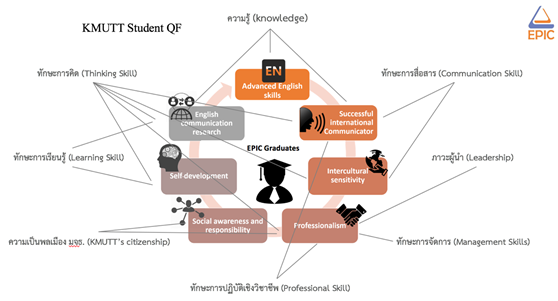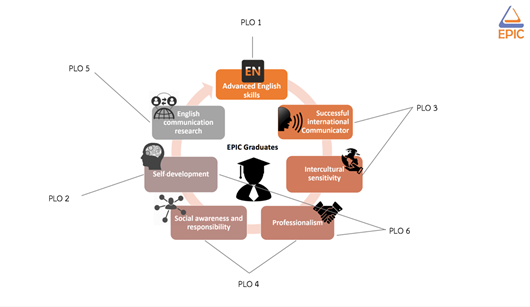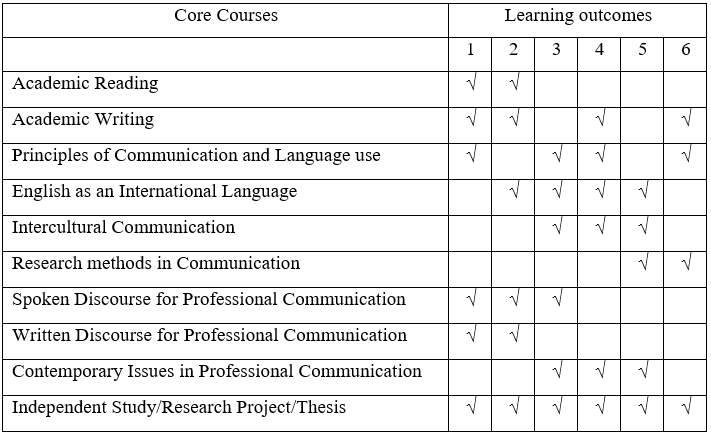AUN-1 AUN-2 AUN-3 AUN-4 AUN-5 AUN-6 AUN-7 AUN-8 AUN-9 AUN-10 AUN-11
ผลการประเมินตนเอง

The philosophy of the MA in English for Professional and International Communication (EPIC) is to ensure that participants gain a profound theoretical and practical understanding of what is required to communicate in professional settings. Graduates from this programme will be equipped with an advanced level of English combined with a high level of ability to communicate in the workplace as well as equipped with the tools needed to be able to analyze and use English in various professional settings. Graduates will have a competitive edge in the job market.1.1 The expected learning outcomes have been clearly formulated and translated into the programme
In order to achieve this, this English-medium programme focuses on professionalism involving:
- theoretical and practical concepts in communication, intercultural awareness and high English skills;
- interpersonal skills including developing leadership and goal-orientation, and understanding different working styles
- critical, analytical and creative thinking as well as researching skills to develop problem solving skills essential for the workplace.
- the use of technology to prepare participants for the English medium workplace typical of the computer-mediated, globalized economy
The generic philosophy and objectives above were taken into consideration in designing the courses and teaching methods. After the programme was run for years, we gained feedbacks from our graduates, their employers and teachers and staff members in the programme. So, we revised the curriculum, adjusted the courses’ objectives and contents, teaching methods and assessments. We commonly have meetings before the term begins to overview the connections of the courses taught in that term to ensure that all the courses lead towards the same direction to fulfil the learning outcomes and objectives of the programme.
The programme committee members and teachers then gathered to in order to specify unique attributes of the graduates. The programme philosophy, objectives and the university’s student quality framework were carefully taken into consideration.
Figure 1. KMUTT student QF and Characteristics of EPIC graduates

The expected learning outcomes were then formulated to ensure that graduates from the programmes will possess all the expected attributes.
Programme Learning Outcomes
- Graduates can use English, all the four skills, effectively and appropriately in professional settings.
– Graduates show high proficiency in English communication through listening and speaking in professional settings. They can perform effective oral presentation, discuss ideas, make arguments and negotiate. They demonstrate proper manners in communication in different professional and international settings.
– Graduates can read and write in English professionally. They can write professional emails, reports, articles and so on. - Graduates can analyse the English language in order to continuously develop their own English ability.
– Graduates can apply linguistic theories to analyse English in their professional settings to formulate proper and effective language patterns.
– Graduates can apply the outcomes of their analysis to improve their communication ability. - Graduates can demonstrate their knowledge and understanding of communication theories through communication. They show awareness of cultural difference and roles of English as an international language.
– Graduates can explain communication principles both theoretically and practically.
– Graduates can analyse and identify communication problems and provide appropriate solutions.
– Graduates can explain their own culture, other cultures and international culture.
– Graduates show their skills to communicate with people from similar and different cultures.
– Graduates can analyse, understand and accept different values and perspectives of other people in their professional setting and society. - Graduates can work professionally.
– Graduates show their management skills. They can work individually and be a good team player.
– Graduates show their planning and leadership skills. They can formulate work objectives and delegate jobs and responsibilities in order to reach the objectives successfully.
– Graduates show their skills in researching, analyzing and dealing with information.
– Graduates show that they can adapt themselves to suit with different kinds of jobs. They can solve unexpected problems.
– Graduates can evaluate their own work performance. They can explain their strengths and weaknesses to improve themselves.
– Graduates show their understanding of work ethics and apply them to their jobs.
– Graduates can explain roles of language and communication that impact social values. - Graduates can conduct research in English for professional and international communication
– Graduates can apply language and communication theories to their profession.
– Graduates can initiate ideas and identify gaps for gaining new knowledge.
– Graduates can present their knowledge to public. - Graduates show that they can adapt themselves to technology used in their career.
– Graduates can use technological devices for searching, learning and development.
– Graduates can apply technology to facilitate their work.
Figure 2. Programme Learning Outcomes and Characteristics of EPIC graduates

1.2 The expected learning outcomes cover both generic and specialized skills and knowledge.
As the name of the programme suggests, the core skills and knowledge of our graduates can be stated namely ‘English’, ‘Professional’, ‘International’, and ‘Communication’.
Table 1.1 Relationship between the core skills and knowledge and learning outcomes

To foster the learning outcomes, objectives of the courses in the programme are carefully considered. Therefore, each of the courses take their roles to help achieve the programme’s expected learning outcomes.
Table 1.2 Core courses and expected learning outcomes

1.3 The expected learning outcomes clearly reflect the requirements of the stakeholders.
To formulate the outcomes, the programme gathered information from different stakeholders including Thailand Quality Framework (TQF), University, Employers, Graduates, Current students and Teaching staff. (see มคอ 2).
